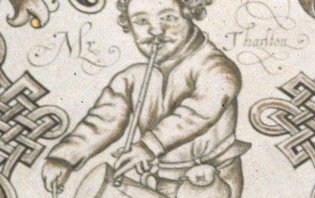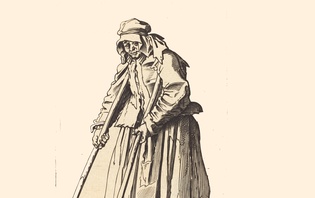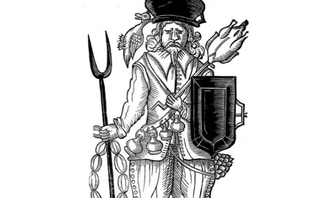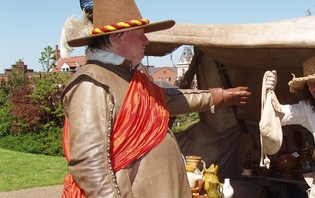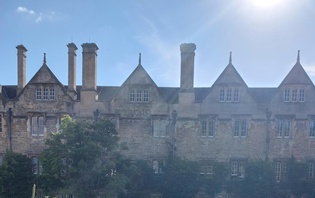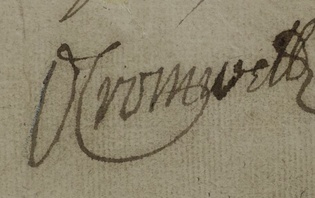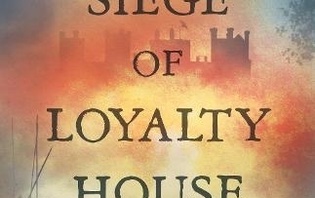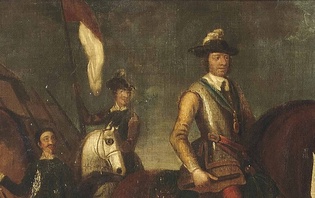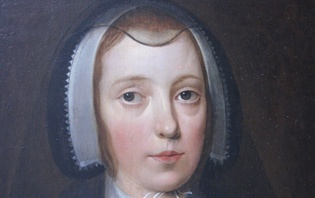‘Civil War, Memory and Authority’: A Conference Blogpost
The sun shone down from a cloudless blue sky on the morning of 4 July 2019 as delegates from a score of British universities assembled in Oxford to attend the project’s midway conference, entitled ‘Civil War, Memory and Authority in England, 1642-1700’. Co-organised by two members of the project team – Professor Mark Stoyle and Dr Lloyd Bowen – the event was designed to bring together some of the key scholars who are currently investigating the ways in which the mid-seventeenth-century conflict was remembered after the guns had fallen silent. Here, Mark Stoyle reports on the events of the conference…
Having made our final dispositions over breakfast, Lloyd, my wife, Lynn, and I made our way to the conference venue: the Quaker Meeting House in St Giles, which – with its beautiful gardens and general air of calm and serenity – is, without doubt, one of the most perfect places in the country for a group of scholars to come together to engage in fruitful, yet relaxed, intellectual discussion. Once arrived at the venue, we scattered to our respective posts: Lloyd to carry out a last check on the PowerPoints and the IT; Lynn to prepare to welcome the invitees and provide them with their conference packs as they streamed through the door; and me to liaise with our hosts, Jacqui and Deb, as we finalised all of the arrangements for the day’s events. At 9.00am precisely our first guests began to arrive, and a cheerful crowd of historians – including our PI, Professor Andy Hopper, and the other two members of the project team, Dr David Appleby and Dr Ismini Pells – was soon assembled on the main lawn: enjoying not only the coffee and tea, but also one another’s company and the general ambience.
Refreshed, we took up our places in the Meeting House itself – a high-ceilinged, oak-lined room, with splendid views of the gardens on either side – and prepared to turn our thoughts back from the summer of 2019 to the much darker summer of 1642, to the bloody civil war which ensued and to the enduring legacies of that conflict. Lloyd and I kicked off the proceedings with a few introductory remarks in which we welcomed everyone to the conference and sketched out our plans for the day. I noted, in passing, that I’d been working on the memory of the Civil Wars for almost a quarter of a century, and that I could never have imagined, when I first began to research what then seemed a very recherché topic, that I would one day be co-hosting an entire conference devoted to that same subject. Lloyd went on to explain why we had decided to entitle the conference ‘Civil War Memory and Authority’, rather than ‘Civil War, Memory and Welfare’ – which is, of course, the title of our broader project. He noted that we’d taken this decision, partly to underscore the fact that this event would possess a distinct identity in its own right, but chiefly because we were keen to explore the specific theme of how memories of war and concepts of authority had interacted during the decades after 1642. Our own two papers, Lloyd added, would demonstrate how wartime memories were deliberately deployed, repurposed and sometimes bent entirely out of shape in order to augment or reduce the authority of specific individuals in the post-war world. He concluded by noting that we hoped that sidelights upon this same theme might emerge from some of our fellow-speakers’ papers, too – while stressing, of course, they had been given free-rein to interpret the conference themes just as seemed most appropriate to them!
With the preliminaries out of the way, Lloyd then introduced the first of our key-note speakers, Professor Ann Hughes of Keele, who delivered a wonderfully fresh and thought-provoking paper entitled ‘When the Scotts Army did March Thorow our County: Transformations of Space and Place in the English Revolution’.
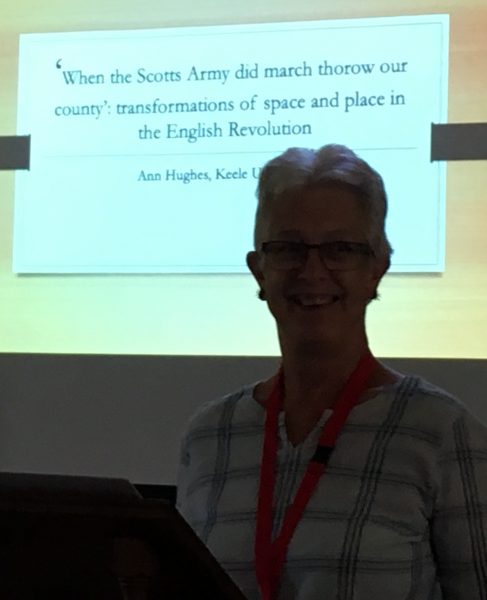
Prof. Ann Hughes delivering her keynote speech
In this talk, Ann explored how the events of the 1640s and 1650s had not only altered the physical environments in which many people lived – through the extensive destruction of property, for example – but had also irrevocably altered the ways in which they saw the world around them, as specific locations which had once possessed merely mundane, diurnal associations now became haunted by dark memories of robbery, violence and death. The members of the project team were delighted to note that Ann used Nottinghamshire maimed soldiers’ petitions which David had recently transcribed and uploaded to the ‘Civil War, Memory and Welfare’ website to illustrate some of her specific points: for example, the fact that the phrase ‘the Trent Bridges’ had come to be understood, in retrospect, not just as the name of a familiar crossing-place, but also as the name of a site of especially bitter conflict during the Civil War. Ann’s paper was then beautifully complemented by that of our second speaker, Dr Imogen Peck of the University of Warwick, who addressed us on the subject of ‘Civilian Accounts of the British Wars, 1642-60’. In a deeply-researched and elegantly-crafted paper, Imogen explored the neglected subject of how civilians had petitioned for redress in the wake of the conflict, considering, along the way, such topics as the specific language which the petitioners had deployed, the types of suffering and injury for which they had sought compensation and the ways in which the phraseology of the petitions submitted by male and female sufferers had differed.
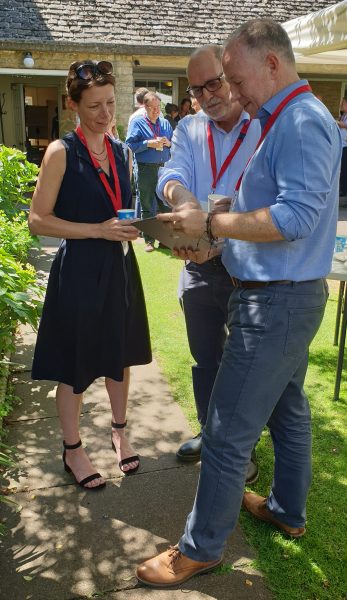
IT Project Manager Chris Carter demonstrates the Civil War Petitions website to conference delegates
After a short break for refreshment, we reassembled to hear talks delivered by our second panel of speakers: both of them members of the project-team. I began by introducing Dr Ismini Pells – our project manager at the University of Leicester – who gave a sparkling paper entitled ‘From Revolutionary Bulwark to Stuart Loyalists: The Restoration Re-fashioning of the London Artillery Company, 1660-1668’. Drawing on her deep knowledge of the records relating to seventeenth-century London in general, and to the Artillery Company in particular, Ismini revealed how the company – a body which had played a central part in the Parliamentarian war effort during the 1640s and which had counted no fewer than six of the regicides among its members during the 1650s – had been re-fashioned after 1660 to serve as a vital prop of monarchy. It was a fascinating and highly revealing discussion – and one which left many members of the audience feeling that they had hitherto failed to appreciate the key role which the company had played in England’s seventeenth-century troubles. Ismini was followed by Lloyd whose paper – in a pun which will be fully intelligible only to those who are familiar both with the oeuvre of the 1980s electro-group New Order and with the history of the Civil War in Wales – was entitled ‘Poyer, Corruption and Lies: Shaping the Recent Past in Civil War Pembrokeshire’. In this brilliant and absorbing talk – which drew on a series of contemporary printed pamphlets, some of which have never been cited before – Lloyd demonstrated how, in a battle over the memory of the recent past, the Parliamentarian commander John Poyer saw his wartime record denigrated during the mid-1640s by a group of ‘ambodexters’, or turn-coat Royalists, who managed to persuade the regime in London that it was they, rather than Poyer, who were its true friends. As Lloyd went on to show, the consequences for Poyer – who was eventually provoked into open revolt by this manifest injustice – proved fatal; he was executed by firing-squad in 1649.
With the morning’s papers at an end, we now fanned out into the garden to chat in the sunshine, to relax in the deck-chairs which had been set out in the shade of the marquees and to enjoy the excellent lunch which had been laid on for us by our caterers: ‘Waste2Taste’, an Oxford-based firm whose mission is to reduce food-waste by using high quality surplus food.
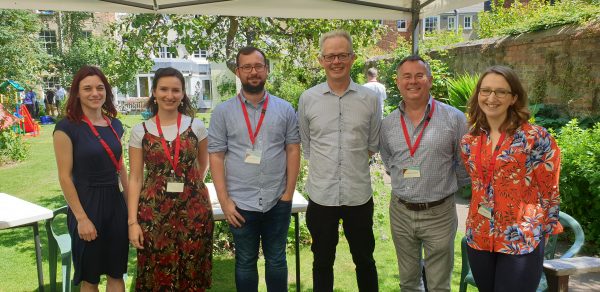
Prof. Mark Stoyle with current and former PhD students: [left to right] Imogen Peck, Natalie Williams, Lewis Brennen, Mark Stoyle, Alistair Dougall and Laura Pilsworth
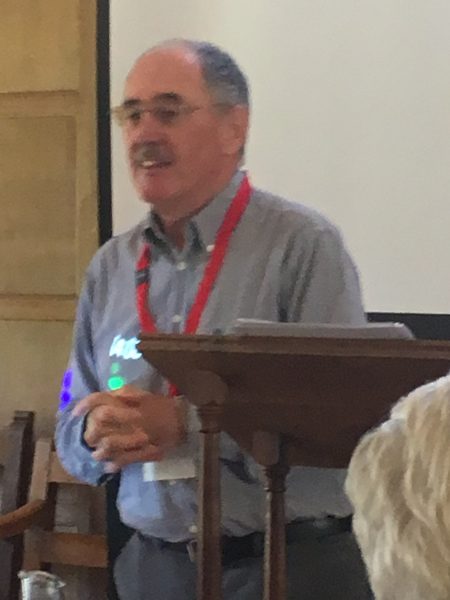
Prof. John Walter delivers the second keynote speech
We reconvened at 2.00 for our second key-note paper, which was delivered by Professor John Walter of the University of Essex, and entitled ‘Remember 41! Popular Violence and Political Memory’. In a masterly address – one which ranged widely over space and time and which was illustrated by many vivid examples – John explored why it was the year 1641 – rather than, say, the year 1646, when the Royalists were defeated, or the year 1649, when Charles I was executed – which was looked back on after the Restoration as the highpoint of ‘fanatical’ enthusiasm and popular rage. Above all, John argued, it was the fact that there had not been ‘such a perceived lack of respect for order and authority in England’ since the Peasants’ Revolt of 1381 as there had been in 1641 which had caused ‘Remember 41!’ to become such a potent rallying cry for conservatively-minded English folk as they anticipated fresh social and political turmoil during the 1670s. John was followed by Dr Charlotte Young, of Royal Holloway, whose paper was entitled ‘I Faithfully Served His Majestie to the End of those Infortunate Warres: Presenting Royalism in Sequestration Papers, 1643-1661’. In her fascinating – and often very amusing talk – Charlotte compared and contrasted the ways in which those who had been accused of supporting Charles I during the Civil War, first, after 1646, did all they could to play down the extent of their wartime Royalism in their petitions to the Parliament to compound, and, then, after 1660, did all they could to play up their wartime Royalism in an attempt to persuade Charles II to compensate them for their losses during and after the war.
The last two talks were delivered by me, and by my friend and colleague from the University of Southampton, Dr Alice Hunt. In a subtle, allusive paper entitled ‘Ceremony and Memory: Charles II’s Coronation 1661’, Alice showed how memories of the 1640s and 1650s had whispered around the splendid coronation ceremony which was staged for Charles II in 1661, and how – like spectres at the feast – the un-laid ghosts of the Civil War and Interregnum had quietly, but insistently, served to undermine the show of unity and unconstrained majesty for which the king and his ministers were striving. I then followed Alice with my own talk, entitled, ‘Extreme Trials of Fidelity? Captain Bartholomew Gidley and Royalist Memories of the Civil War’. This paper reconstructed the life and career of a Royalist officer who had served in the ‘Tinners’ regiment raised from the Dartmoor Stannaries during the Civil War, and explored how his wartime exploits had been memorialised in a series of post-Restoration sources: including a unique silver medal, an ornate funerary stone and a clutch of petitions for relief which had been submitted by former Royalist soldiers who had served under his command. These petitions will, in due course, be made available for all to consult on the project website. The conference then came to an end with some valedictory words from me and Lloyd, and a kind vote of thanks from Andy, before we all repaired to the Royal Oak pub nearby: thoughts of Boscobel flitting appropriately through our minds as we settled down to enjoy a post-conference drink.
All in all, it was a wonderfully stimulating – and convivial – day, and Lloyd and I are enormously grateful to everyone who joined us on 4 July: above all, of course, to our inspirational speakers. We were especially glad to welcome Dr Ed Legon and Dr Erin Peters – both of whom have recently published important monographs on the ways in which the Civil Wars were commemorated and remembered in post-1660 England – and Professor Mark Cornwall, who is one of the greatest authorities on the memory of a still more terrible conflict: the First World War. Finally, we were delighted to be joined by our project mentor, Professor Jane Ohlmeyer, and by many of our fantastic project volunteers, without whom we could never have got as far as we have. Our sincere thanks go to one and all.
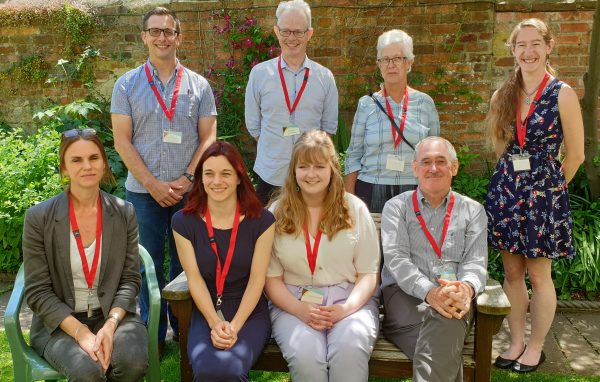
The conference speakers: [standing, left to right] Lloyd Bowen, Mark Stoyle, Ann Hughes, Ismini Pells; [sitting, left to right] Alice Hunt, Imogen Peck, Charlotte Young and John Walter

